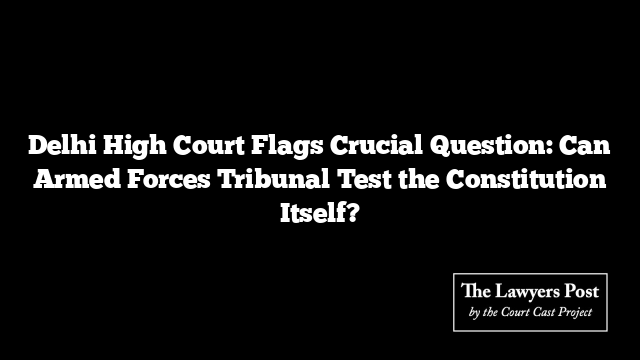In a case that stretches far beyond one sailor’s story, the Delhi High Court has turned its attention to a larger constitutional puzzle — can the Armed Forces Tribunal (AFT) examine the legality of laws beyond its own founding statute?
The query surfaced in a petition filed by a former Navy officer, now a transgender woman, who is challenging her discharge from service following gender reassignment surgery. What began as a personal fight against alleged discrimination has evolved into a debate that could reshape the boundaries of military justice in India.
A Full Bench led by Chief Justice Devendra Kumar Upadhyaya, with Justices C Hari Shankar and Om Prakash Shukla, has sought the Ministry of Defence’s official stand on the AFT’s authority to decide the constitutional validity of statutory provisions outside the Armed Forces Tribunal Act, 2007.
“This issue holds implications across all branches of the Armed Forces — the Army, Navy and Air Force alike,” the Court observed, directing that the Defence Ministry’s response come directly from the Secretary or another senior officer of equivalent rank.
Senior Advocate Gautam Narayan has been appointed amicus curiae to assist the Bench, with instructions for all sides to submit written arguments and case compilations by November 14. The matter will next be heard on November 28.
The Full Bench was constituted after a Division Bench referred three weighty questions for adjudication — most notably, whether the AFT can rule on the validity of provisions like Section 9 of the Navy Act, and whether a previous decision in Neelam Chahar extended such powers to tribunals in general.
The petitioner, a Navy officer who transitioned during service, contends that her dismissal under Navy Regulations violates her constitutional right to gender identity. She alleged being confined to a psychiatric ward for months and subjected to repeated, unwarranted medical evaluations after revealing her transition.
The Centre, on the other hand, defended the termination, claiming it stemmed from misconduct — citing her altered appearance, long hair, and failure to maintain prescribed naval decorum, as well as repeated absences without leave.
Arguing that the challenge involves testing the constitutional validity of naval provisions, the High Court concluded that only a Full Bench could determine whether such scrutiny lies within the AFT’s jurisdiction — or whether it belongs solely to constitutional courts.
For now, the case stands at the intersection of gender rights, military discipline, and the limits of tribunal authority — a crossroads where one individual’s battle could redraw the contours of justice within the Armed Forces.





